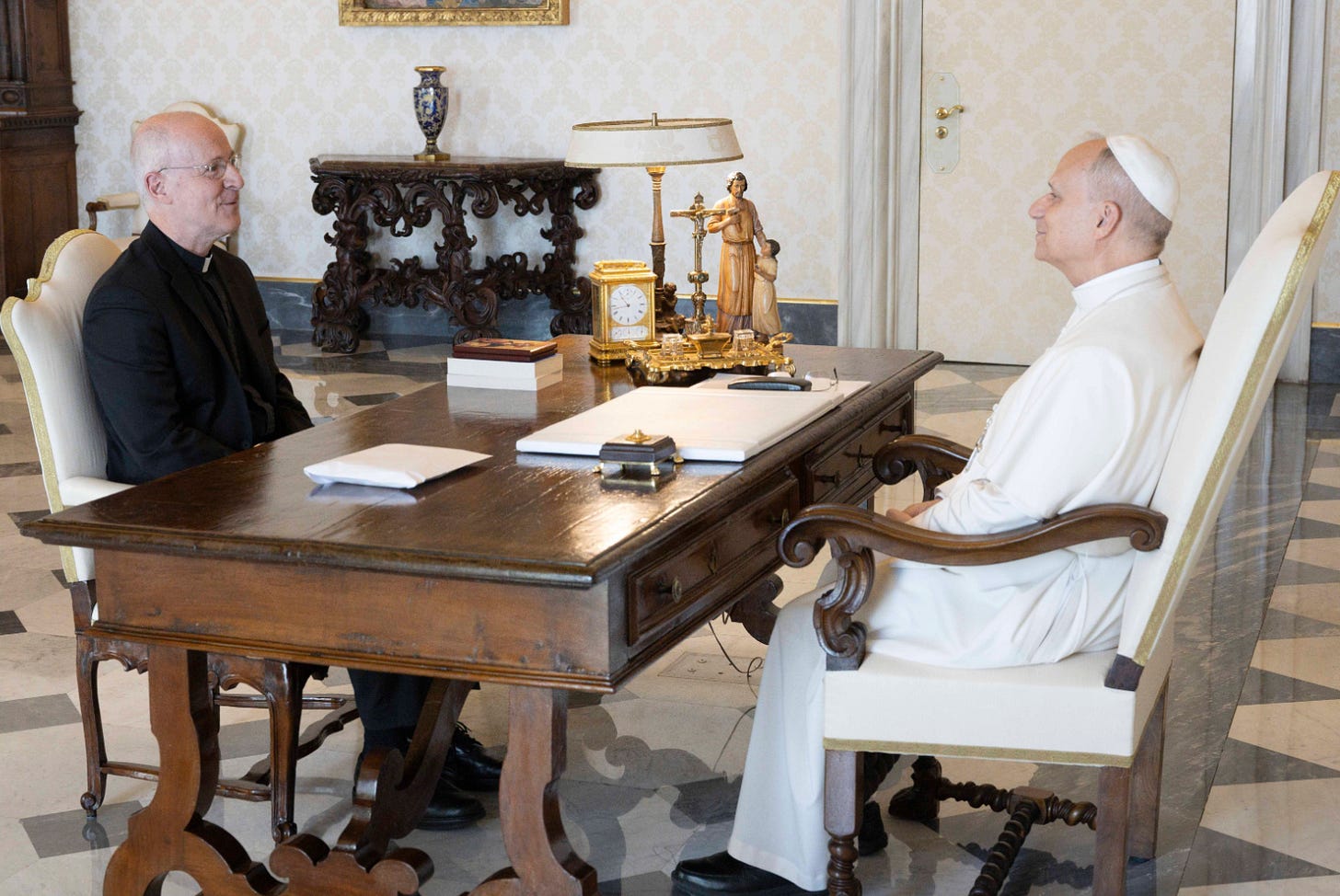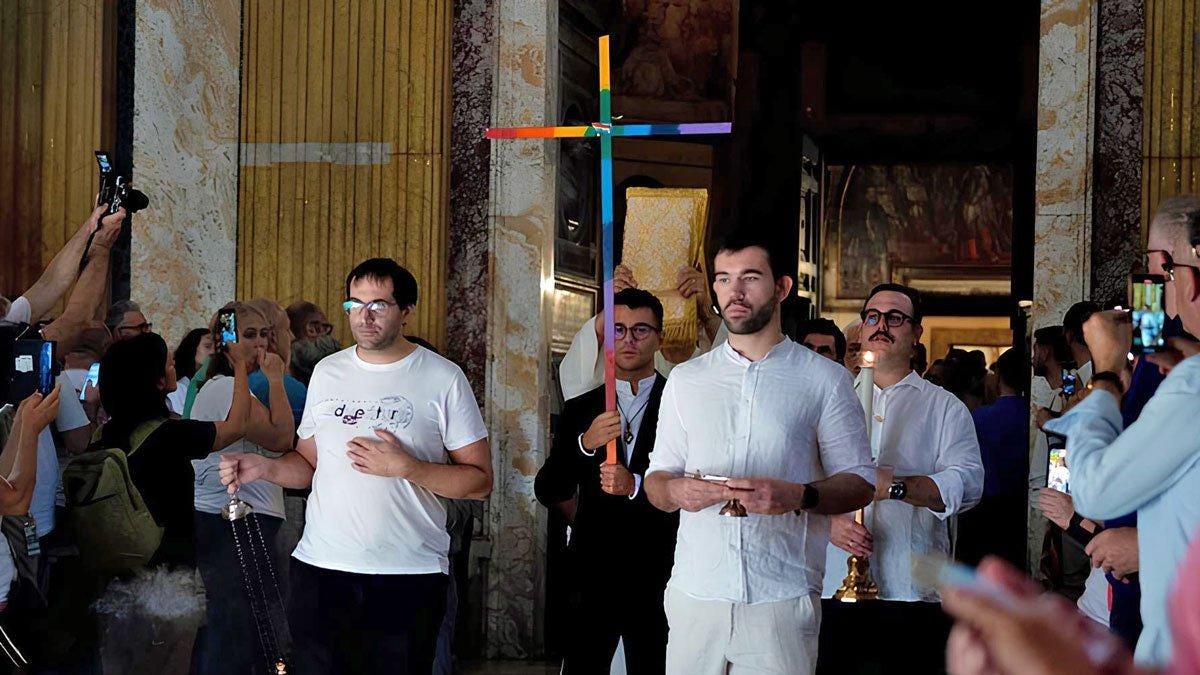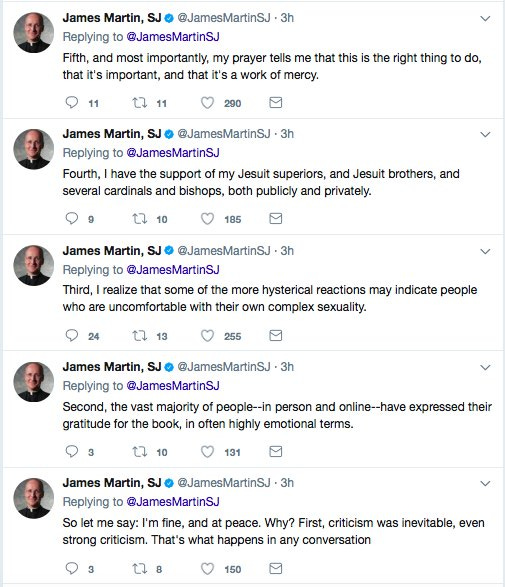Pope Leo XIV and the James Martin Controversy
Why a private audience and a Vatican pilgrimage are raising urgent questions about clarity, doctrine, and the future of Catholic teaching
What a shame that the joy of two new Saints of the Church, canonised by Pope Leo XIV, was so overshadowed by scandal. The recent meeting between New York Jesuit Father James Martin and Pope Leo XIV and the subsequent Holy Year Pilgrimage by a group of self proclaimed “LGBT Catholics” has created a storm of controversy among the faithful.
I have resisted commenting up to this point as I wanted to avoid knee jerk reactions or tired tropes that seek to jump onto tribal bandwagons. Instead, I would much rather carefully consider all the factors at play and have waited to see what has been subsequently been revealed.
Talking this all over with Katherine today and trying to see it from the Vatican perspective, she really cut to the chase when she said to me “You wouldn’t have let this happen if you were the Pope Mark”. She is right. And if it did happen without my say so, I would recognise that a carefully written clarification of Church teaching was required quickly. Because all this opposes Church teaching, it sends a contradictory message, and that is only a bad thing.
The only details we have of the actual content of the meeting come solely from Fr. Martin, thus the verisimilitude is difficult to discern. Many have defended the Pope by saying that he meets all kinds of people, some good, some bad: Meeting someone does not mean condoning their agenda (it could be quite the opposite). However condonation is precisely the telling we get from Fr. Martin, who wasted no time in reporting:
"The message I received from him, loud and clear, was that he wanted to continue with the same approach that Pope Francis had advanced, which was one of openness and welcome. So, it was very much a hopeful message of continuity."
Meanwhile, from Pope Leo, we get only silence. So if we take Fr. Martin's word for it, as we have no other, can we really say it is anyone other than Pope Leo's fault that we do so?
Hot on the heels of this problematic audience, we had an LGBT Holy Year pilgrimage to the Vatican. Interestingly, Pope Leo himself did not acknowledge the group in his own greetings to various other pilgrimages taking place the same weekend. A journalist friend of mine in Rome told me Leo avoided the group and did not even send Archbishop Fisichella, as usually happens at these Jubilee events (he serves as the pro-prefect of the Dicastery for Evangelisation's Section for the New Evangelisation, a role in which he has been specifically tasked by the Vatican with coordinating and organising the entire 2025 Holy Year Jubilee, including its various thematic events, pilgrimages, and particular Jubilees for specific groups), instead sending “Just a small Italian Bishop”.
Earlier the pilgrims had gathered at the Gesu, the Jesuit church in Rome, for a Mass celebrated by what an Italian journalist friend described to me as a “small Italian Bishop”, Francesco Savino, the vice-president of the Italian bishops’ conference. In his homily the bishop cited the historic tradition of the Jubilee as “the time to free the oppressed,” and said that it is now time for the Church to “put living truth before dead truth.” He assured the congregation that Pope Leo had approved the LGBTQ pilgrimage “with great tenderness and great sweetness.” For many, both inside and outside the Catholic world, who look to the papacy as a beacon of clarity, these events send a confusing and painful message. Could Pope Leo have declined such a meeting without antagonising the powerful cardinals who lobbied for Martin? It seems unlikely, but the deeper question is whether he should have taken that risk for the sake of safeguarding the clarity of Catholic teaching.
This episode cannot be understood in isolation. Father Martin has long boasted of the support of high-ranking cardinals such as the Cardinal Archbishop of Chicago, Blase Cupich, whose influence would appear to have been decisive in the last conclave. It was their lobbying that helped secure the election of Cardinal Prevost as Pope Leo XIV, just as they have helped secure Martin’s visibility in the Church. Alongside this network stands Monsignor Leonardo Sapienza, Regent of the Prefecture of the Papal Household. While Sapienza cannot independently grant audiences, his office manages their logistics, and he is known as a skilled facilitator. It is reasonable to suppose that his influence could have smoothed the way for Fr. Martin once papal consent was given. Added to this is Martin’s own deep familiarity with Vatican protocol, honed during years of correspondence with Pope Francis and repeated papal encounters, which positions him to navigate channels of access far more deftly than most priests. This nexus of support explains why Martin has been able to carry forward a ministry that, far from calling same-sex attracted Catholics to conversion, presents a completely different and alternative anthropology. Instead of affirming the Gospel truth that we are created in the image of God and called to holiness, Martin’s approach risks reducing human identity to sexual orientation. To accept the LGBT acronym as a definitive marker of who and what we are is to participate in a form of idolatry, placing sexual inclination at the centre of personhood, contrary to Catholic teaching.
The Church’s actual teaching has never been ambiguous. It is grounded in Scripture, Tradition, and the clear teaching of the Magisterium. Saint Paul’s admonition in 1 Corinthians 6:9 leaves little doubt about the eternal consequences of sexual acts that are not ordered toward procreation. The Congregation for the Doctrine of the Faith, in its 1986 Letter to the Bishops on the Pastoral Care of Homosexual Persons, restated this perennial truth with both firmness and compassion. The Catechism of the Catholic Church echoes the same teaching: homosexual acts are intrinsically disordered, though persons with same-sex attraction are to be treated with dignity and respect. Yet, instead of strengthening families and helping parents guide children who wrestle with these challenges, the Church’s current leadership has sent mixed signals. Many parents, myself included, find our efforts undermined by a schizophrenic pastoral approach in which the Catechism says one thing, while prominent priests and bishops suggest another.
This is not an abstract issue. Young people today instinctively recognise inauthenticity and nothing disillusions them more than hypocrisy. In a secular culture where this one issue dominates, we should not be at all surprised that they ask hard questions: If someone is born with an attraction they did not choose, why should it be sinful? Why would God permit such an inclination if it cannot be fulfilled? These are not questions to be dismissed, but neither are they answered by simply bending doctrine to accommodate cultural currents. What is needed is a coherent theology that explains suffering, sacrifice, and sanctification in light of the Gospel. Our deepest longings cannot be fulfilled apart from God, and the Church has long guided the faithful in how to live in accordance with that truth. Saint Paul reminds us in 1 Corinthians 10:13 that God provides a way out of every temptation. St. John Paul II, in his Theology of the Body, taught that human desire finds true fulfillment only in self-gift and love ordered toward God, not merely in satisfying fleeting passions. St. Augustine wrote in Confessions that turning toward God is the only path to authentic joy. And St. Thomas Aquinas emphasised that virtue is the habit that directs our desires rightly, helping us to live in harmony with our nature and with God’s plan. These teachings converge to show that the cross we bear, including struggles with disordered desires, is not a punishment but an invitation to transformation and union with Christ. We have the answers in the Church so why are we looking to abandon the Tradition for a twisted secular narrative?
The pastoral duty of the Church is to reach out to those with same-sex attraction with the wisdom of Christ and the Saints and the experience of all the centuries of Church teaching, to invite them into the love of Christ and the fellowship of the Church. They are no less created, loved, and redeemed than any other soul. But there is a fundamental difference between drawing people to Christ and altering the Gospel to accommodate their desires. Too often, Fr. Martin’s ministry appears to operate on the latter premise. Evidence for this is not lacking: his public rejection of key Church teachings, his alignment with secular ideologies, and his persistent attempts to normalise homosexuality and transgenderism all of which stand in contradiction to two millennia of Catholic teaching. Cardinal Müller and other theologians have pointed out the grave danger of such a program. It is not authentic accompaniment but a dismantling of Christian anthropology.






